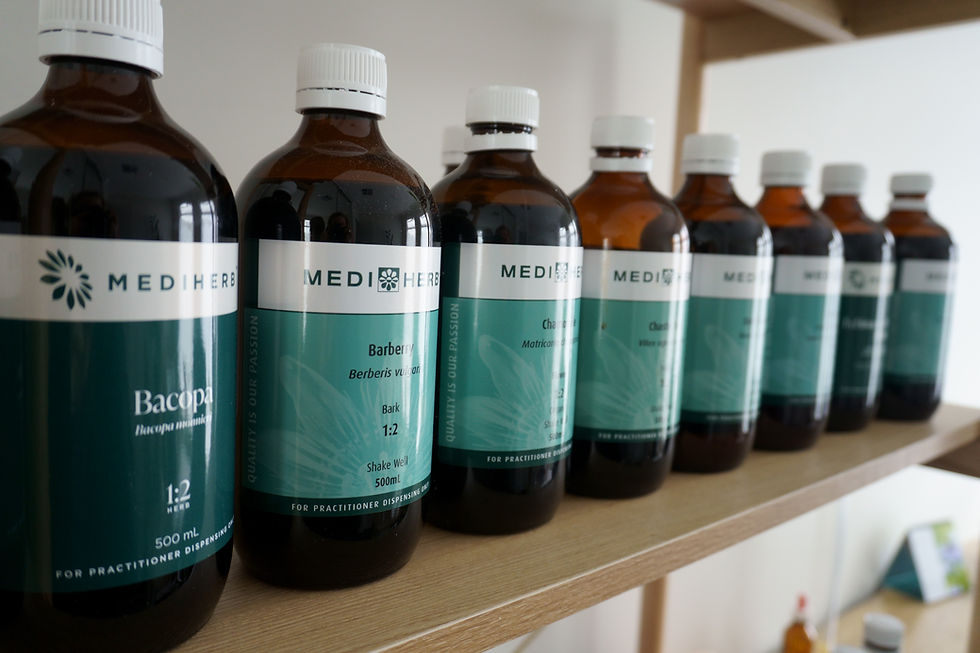8 Herbs & Supplements for Thyroid Health
- Allison Buckley
- Sep 13, 2022
- 5 min read
If you are experiencing a thyroid condition, whether it be hypothyroidism, Hashimoto’s or an overactive thyroid (hyperthyroidism), the common western treatment is simply medication such as thyroid replacement therapy or anti-thyroid medication. Although these medications, in the right dose, can make a huge difference for many women struggling with thyroid issues, they are not the only option and don’t work to restore, nourish or improve thyroid health.
Only to replace what is no longer working.
This is where nutrients and herbs can come in and make such a difference to your thyroid healing journey. To learn more about what an integrative approach to hypothyroidism & Hashimoto’s looks like, you can read this post here.

Your thyroid requires nutrients to function. Without adequate iodine, selenium or zinc, for instance, your thyroid can’t convert inactive thyroid hormones into their active forms efficiently enough, resulting in an underactive thyroid. There are many other factors that can impact your thyroid function and block thyroid hormones, which I will discuss in a future post.
The Right Thyroid Supplements for you...
The correct thyroid supplements can be incredible and a game changer to how you feel and, when used in conjunction with the proper nutrition for you and lifestyle practices, may even restore your thyroid health completely. The catch is making sure that the supplement is right for you and in the right form. This is where a functional practitioner such as a Naturopath, Nutritionist or functional doctor can offer support and be an important part of your healing journey.
Below I am going to outline 6 key Herbs and Nutrients for thyroid health. It’s important to keep in mind that these herbs and nutrients may not be suitable for everyone and I recommend that you seek individualized support from a health professional prior to taking them.
Zinc
Zinc is a vital nutrient that the thyroid is dependent on for the conversion of T4 into T3, along with many other biochemical reactions occurring within the thyroid and body. Low zinc levels are associated with reduced thyroid levels and studies show supplementation can improve conversion and communication pathways between the hypothalamus within the brain, and thyroid.
Dosage: 30mg/day
Vitamin D3
Vitamin D is most notably important in autoimmune thyroid conditions due to the effects it has on immune regulation. Studies show vitamin D deficiency predisposes towards autoimmune disorders. The body also requires vitamin D to produce and use thyroid hormones.
Ideally, testing your vitamin D levels is important and serum levels above 120nmol/L is considered optimal (Naturopathically speaking).
If for some reason you can’t get your vitamin D checked, most adults can supplement 1000 IU/day.
Selenium
Selenium is another trace mineral that is required for healthy thyroid function. The thyroid gland contains the highest amount of selenium among all of the body’s tissues and low selenium intake is associated with a number of thyroid disease states, including autoimmune thyroiditis. Selenium plays an important role as an antioxidant defense mechanism within the thyroid gland, by being used to produce glutathione, a powerful antioxidant that protects the thyroid gland from free radicals and inflammation. When the production and conversion of thyroid hormones occur, it produces free radicals that glutathione then disarms to protect the cells from damage. If there was a deficiency in selenium, less glutathione would be produced and the thyroid cells can be damaged by the free radicals & inflammation.
Selenium is also required for the conversion of inactive thyroid hormones (T4) into the active hormone (T3). Studies have shown a reduction in TPO antibodies with selenium supplementation, improving autoimmune thyroiditis.
N-acetyl-cysteine (NAC)
N-acetyl-cysteine (NAC) converts to glutathione, the powerful antioxidant that protects your cells. This is why NAC is an important nutrient when it comes to thyroid conditions driven by an autoimmune response (such as Hashimoto's). It offers protection to thyroid cells by exerting antioxidant mechanisms and keeping reactive oxygen species at a minimum. Not to mention, if a thyroid condition is driven by toxin or heavy metal accumulation, NAC improves detoxification pathways and cellular protection, reducing inflammation & tissue damage.
Inositol
Selenium combined with Inositol has been well studied to show powerful benefits on reducing thyroid antibodies and restoring normal thyroid hormone levels. It appears more powerful when in combination then selenium alone, making it an important combo for autoimmune thyroid conditions.
Iron
Iron is an essential element and plays a range of different roles in biochemical reactions, including for thyroid function. The initial two steps in thyroid hormone production require the presence of iron which means any deficiency can prevent this from happening. If you have hypothyroidism, this can also reduce the absorption of iron due to possible decreased absorptive capacity. If you have Hashimoto's and gluten sensitivity or celiac, the disruption caused to the gut lining can further hinder nutrient absorption, resulting in more nutritional deficiencies impacting the thyroid. As you can see, the health of the thyroid relies on good gut health but thyroid conditions can also impact digestive function which is why I always ensure my clients are receiving a holistic approach that addresses all aspects.
Iron in the wrong form or incorrect amount is highly inflammatory. Before supplementing, you need to ensure you have checked your iron stores and that you are taking a good absorbable form of iron and correct dosage for your specific health and levels. I recommend iron bisglycinate as it is more gentle on the digestive system (doesn't tend to cause constipation) and it is more absorbable. Many over the counter iron supplements contain far too much iron that your body can't absorb in one go, which then can become inflammatory so please seek guidance from a holistic practitioner.
Ashwagandha
Ashwagandha is known as the herb that is amazing for stress (reducing cortisol, our stress hormone) & the nervous system (which can of course positively influence thyroid hormones alone). Studies also show it has positive effects on increasing thyroid hormone levels of both T4 and T3. Some studies also show benefits on the liver, which is where T4 to T3 conversion occurs.
*Not safe to use in pregnancy.
*Generally Safe in breastfeeding
Bacopa
This herb has many benefits for those with thyroid issues, particularly because it can improve cognition & reduce brain fog, a common symptom of hypothyroidism. Bacopa positively influences the nerves, as well as exerting thyroid-stimulating abilities, increasing T4 levels.
*If pregnant, seek professional supervision
Always address what is causing YOUR thyroid condition
While these herbs and supplements are incredible and have some amazing studies to back them up, it’s always important to focus on what is causing your thyroid condition. This is why an integrative and holistic treatment plan is crucial for nourishing, healing and restoring your thyroid function.
If you would like to chat about a personalized treatment plan for you, you can work with me by booking in here
Allison xo




Managing thyroid conditions is easier with Thyroid Support.